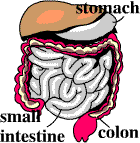Irritable Bowel Syndrome (IBS) - Update, part deux
Created | Updated May 5, 2006

To do: Add accurate and up-to-date info on treatment. Split up anecdotal part, and consider deleting bits that are extremely biased or out-of-date.
It's a pain in the backside!
IBS does not, as the name suggests, affect only the bowel, but the whole digestive system. Primary symptoms are diarrhoea, constipation, gastric reflux, excess wind (don't laugh. titter if you like, but don't laugh, it's not funny at all), indigestion, stomach cramps, nausea or any combination thereof.
Is IBS A Disease? Is It Contagious?
Irritable Bowel Syndrome (IBS) is considered a Functional Gastrointestinal Disorder. Functional disorders are diagnosed by their symptoms alone - there are no lab tests or x-rays that can tell if someone has a functional disorder. For IBS, the main symptom doctors look for is abdominal pain or discomfort that is associated with bowel movement changes such as constipation or diarrhoea. IBS is also a 'diagnosis of exclusion' - if a person has these symptoms, a health care provider will diagnose IBS only after ruling out other diseases that might be causing the symptoms. Some of the disorders that might need to be ruled out could include infections, food intolerances and inflammatory bowel disorders like ulcerative colitis. It is, however, possible to have one of these disorders and IBS at the same time - in this case, IBS might be diagnosed if the severity of other disorder was not enough to completely explain the gastrointestinal symptoms experienced. And no, it's not contagious like the common cold, influenza or microbial illnesses. It may be genetic, or it may be psychological. It is disruptive to everyday life however.
Some people will read this and ask themselves;
'If that's all it is, why should I bother to go see my GP about it?'
As mentioned above, there are many other disorders that have similar symptoms - it's a good idea to give your doctor the opportunity to rule those out.Even though IBS isn't life-threatening, it can be a significant downer on your quality of life, like having to watch poorly acted sitcoms. You deserve effective treatment. For IBS that is. Just turn off the television otherwise.
A Personal Account of IBS
Unfortunately, as this syndrome1 has such wide-ranging symptoms, many non-specific digestive ailments tends to get labelled as IBS, and many more serious illnesses get overlooked. The consequences of this can be devastating: a friend of mine died of stomach cancer that was originally misdiagnosed as IBS.
The causes are unknown. It is very obvious that stress has an effect on the severity of attacks, but whether it is causal I do not know. I do, however, firmly believe that I first developed the syndrome in my late teens when I decided that the only way for me to lose weight was to eat only one meal a day. After ten years, the combination of my diet and the fact that I was a smoker, a vegetarian and had a stressful job, meant that I ended up becoming depressed. I barely had the energy to crawl back into bed and was taking so much time off work that I am surprised I wasn't sacked. Perhaps it's a case of IBS being a symptom of modern life.
There is no cure. Little help is gained by swallowing medicines and pills to combat the symptoms. Instead an effort should be made to identify the triggers. Management of the syndrome can be achieved but the methods for this vary from person to person. I would never recommend undertaking any treatment without consulting a nutritionist at your local hospital and you should avoid any diet where expensive pills are prescribed as part of the treatment. Personally, I manage my diet by excluding all brassicas2, nuts, seeds, wholegrains, peas, beans and reducing my lactose intake. For the rest of my life I will have to consider the effect of what I eat before I eat it, which for a vegetarian with tomato allergies can make eating out very awkward indeed.
Do You Think You Have IBS?
If you suspect you have IBS, consult your GP and insist that they carry out tests to rule out other organic diseases. If you have no joy the simple plan is to change your doctor. This may just mean seeing another doctor in your surgery, or it could mean seeking the assistance of a specialist at a nearby Hospital. Be aware that Crohn's Disease and some forms of cancer, amongst others, can have similar symptoms. Don’t let anyone put your life in danger by dismissing your symptoms as trivial. You can avoid feeling like life has dealt you a kick in the stomach, literally.
Medical Treatments for ConstipationBBC Health